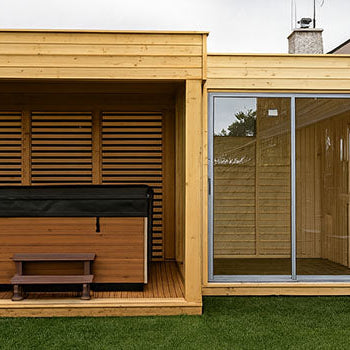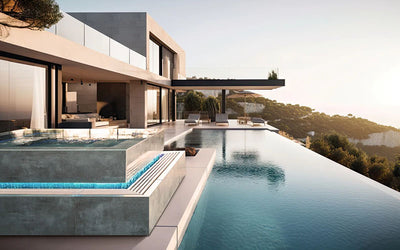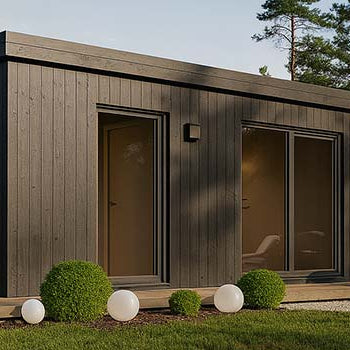Torn between a garden room and a pergola? If you want all-weather comfort, garden rooms win, hands down. But if you're chasing summer vibes on a budget, pergolas are your go-to. Keep reading to discover which one suits your style, space, and sunshine dreams best!

First, What is a Pergola and What Are Its Limitations?
Defining a Pergola: A Structure for Climbing Plants, Not Full Shelter
Imagine sipping iced tea under a wooden frame laced with wisteria, that’s a pergola. It’s an open-sided structure with beams instead of a solid roof, perfect for giving your garden an architectural edge.
Pergolas aren’t built to keep out the rain or block harsh sun. They’re built for beauty and ambience, often used to support climbing plants like roses or vines. It's more about vibe than utility.
The Downsides: Limited Rain and Sun Protection
While they look stunning in summer, pergolas offer minimal protection from the elements. If it rains, you’ll get wet. If the sun's blazing, you'll be playing chase-the-shade.
In short, they're best for fair-weather lounging, not year-round comfort.
1. The Gazebo: For Guaranteed Shelter
What is a Gazebo? (A solid, permanent roof)
Think of a gazebo as the dependable cousin of the pergola. It’s fully covered, freestanding, and designed to give you proper shelter from rain or shine.
Whether you're setting up a hot tub or just want a dry place to read a book, a gazebo has you covered, literally.
Gazebo vs. Pergola: All-weather use vs. open-air feel
Pergolas offer airflow and openness, but gazebos win when it comes to all-season use. They're the right pick if you want something that can survive British weather without flinching.
While pergolas blend into nature, gazebos carve out a defined, sheltered space you can rely on.
Typical Costs and Materials
A basic timber gazebo can cost around £1,000 to £3,000, but custom builds can climb past £8,000.
They’re often made from treated wood, aluminium, or polycarbonate roofing to withstand wind and rain without drama.
2. The Awning: For Flexible, On-Demand Shade
Retractable vs. Fixed Awnings
Awnings attach to your home and extend over patios or windows. Retractable models can be pulled in when not in use, while fixed awnings stay put year-round.
If you want shade that disappears when you don’t need it, retractable is the way to go.
Benefits: Attaches to the house, no legs or posts
One of the biggest perks? No posts in your way. Awnings free up floor space and offer quick shade without blocking your view.
They also blend seamlessly with your home’s exterior, giving your patio a polished look.
Considerations: Wind resistance and durability
Not all awnings can handle the British breeze. Cheaper models might flap or tear in high winds.
If you live in a windy spot, invest in a wind-sensor retractable awning or be ready to pull it in when storms roll through.

3. The Louvred Roof Canopy or Aluminium Pergola
The Modern Solution: Combining the Best of Both Worlds
Want something stylish and smart? Enter the aluminium pergola with a louvred roof. It's the happy middle between a pergola and a gazebo.
You get a sleek structure that looks great year-round, and one that adapts to whatever the sky decides to do.
How Louvred Roofs Work (Open for sun, closed for rain)
These canopies have adjustable slats you can tilt open to let in the sun or close tightly to block rain. Some even come with remote controls, drainage systems, and integrated LED lighting.
Perfect for outdoor dining without the weather guesswork.
Cost: A Higher-End, Premium Option
Luxury comes with a price. Expect to pay anywhere from £5,000 to £15,000+, depending on size, motorisation, and add-ons.
But for a wow-worthy garden centrepiece, many homeowners feel it’s worth the splurge.
4. The Shade Sail: For a Contemporary, Cost-Effective Look
What are Shade Sails?
Shade sails are tensioned fabric panels anchored between walls, trees, or posts. They’re popular in modern gardens and urban spaces.
Simple, stylish, and incredibly easy to set up.
Pros: Inexpensive, flexible, modern aesthetic
They start as low as £100, making them a go-to for quick shade without breaking the bank.
You can play with colours, angles, and layout to create a striking design with minimal effort.
Cons: Not fully waterproof, needs strong anchor points
Shade sails aren’t built for storms. They’re water-resistant at best and can sag or tear if poorly anchored.
Great for sunny patios, but not a substitute for solid structures when the weather turns.
5. The Garden Room: The Ultimate All-Weather Solution
When You Need More Than Just Shelter
Looking for something that works rain or shine, day or night? Then a garden room is in a league of its own. It’s not just an outdoor feature, it’s a full extension of your living space.
From home offices to guest rooms, you can use it however you want, year-round.
The Benefits of a Fully Insulated, Secure, Year-Round Room
Garden rooms come with insulation, electricity, double glazing, and secure doors. That means you can install heating, Wi-Fi, lighting, even plumbing if you're feeling fancy.
They're perfect if you want an escape from the main house but still need creature comforts.
A Different Price Point for a Different Purpose
Expect to spend at least £5,000, but a well-kitted room can go beyond £30,000.
It’s not cheap, but you’re getting a fully functional space that adds serious value to your home.

Comparison Table: Which Option is Best for Your Garden?
| Feature |
Pergola |
Gazebo |
Awning |
Louvred Roof |
Shade Sail |
Garden Room |
| Weather Protection |
Limited |
Excellent |
Moderate |
Adjustable |
Low |
Full |
| Year-Round Use |
No |
Yes |
Partially |
Yes |
No |
Yes |
| Installation Complexity |
Low |
Medium |
Low |
Medium-High |
Low |
High |
| Cost Estimate |
£500–£2,000 |
£1,000–£8,000 |
£400–£2,000 |
£5,000–£15,000+ |
£100–£600 |
£5,000–£30,000+ |
| Aesthetic Appeal |
Traditional/Natural |
Classic |
Modern/Functional |
Modern/Sleek |
Minimalist |
Premium/Custom |
| Best For |
Garden ambience |
Covered dining |
Patio shade |
Luxury lounging |
Small gardens |
All-weather use |









